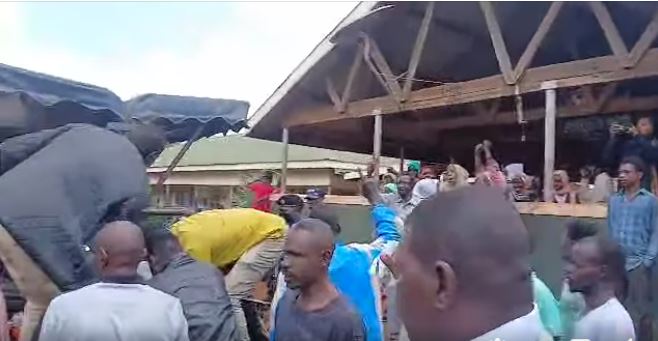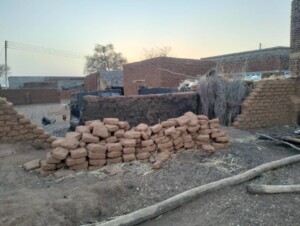Sudanese refugees in Uganda: a journey from death to death

Funeral of Sudanese refugee in Camp Kiryandongo in Ugand - July 14, 2025 (Photo: Supplied)
Prepared by Hamida Abdelghani of New Horizon for Sudan Media Forum
Kabashi Kafi did not know that his journey of escape from the hell of war and death in Sudan as a refugee in Uganda would end with his death in a refugee camp, when he was attacked by fellow refugees from South Sudan in the Kiryandongo camp incidents, due to the conflict over the meagre aid provided by United Nations organisations, according to what an official in the camp that houses Sudanese refugees said.
The camp, located in the Piale district of southern Uganda, housed more than 30,000 Sudanese refugees. In the second week of July, it was subjected to successive knife attacks by South Sudanese refugees. The attacks resulted in the death of one Sudanese refugee and the injury of more than 20 others, some of whom were in critical condition and transferred to hospitals in the Ugandan capital, Kampala, for treatment.
Hussein Timan, head of the Sudanese refugee community in the Kiryandongo camp, told New Horizon that the camp had been subjected to a series of attacks by members of the Nuer community, who live near the Sudanese camp, resulting in the deaths of refugees and the injury of others.
He explained that a Nuer community leader said during a joint meeting with Ugandan authorities that the primary reason for the attacks was “the expropriation of land used by Nuer refugees to cultivate and the resettlement of Sudanese refugees there, in addition to the economic hardship they are experiencing after the reclassification of those ineligible for World Food Programme support.”
He added, “They feel aggrieved because Sudanese refugees have shared public services with them, such as water, schools, and the health centre.”
Sudanese refugees fled their camps following the attacks and gathered inside a refugee reception centre and the headquarters of the United Nations High Commissioner for Refugees (UNHCR), seeking protection from the violence. However, Ugandan authorities later removed them from these sites and transferred them to a temporary facility prepared by the agency, which pledged to protect them, according to eyewitnesses.
Eyewitnesses told New Horizon that large parts of the homes of Sudanese families in the Kiryandongo camp were destroyed following the attack, leaving families and children in the camps in a state of shock and fear. The witnesses reported that many Sudanese refugees fled the camp to the Ugandan capital, Kampala, and other cities, where they are now settled with relatives and acquaintances, awaiting the restoration of security in the camp.
Arrest procedures
Ugandan authorities are conducting investigations into the Kiryandongo camp incidents, with a view to arresting the perpetrators involved in the killing of the Sudanese refugees, according to Hussein Timan, head of the Sudanese refugee community.
In a statement to New Horizon, Timan said that Ugandan authorities have formed a committee to investigate the events and are working to arrest the accused, after declaring a state of emergency and a curfew in the camp. He noted that the leadership office of the Sudanese refugee community in Uganda has directed all eyewitnesses to cooperate with the Ugandan police investigator and provide their testimonies about the events.
He noted the lack of humanitarian organisations’ role in containing the repercussions of the events in the camp, explaining that dozens of Sudanese families are now homeless and without food after their camps were destroyed.
Refugee novel
Sakina, a Sudanese refugee living in the Kiryandongo camp with her four children and three grandchildren, recounted the details of her escape from Sudan and her current experience in the refugee camp. She told New Horizon, “I came with my children from Sudan to Uganda in search of safety. I received a residential plot of land, which I built with bricks, and opened a shop there as an additional source of income, in addition to the aid we receive from organisations.”
Sakina began to adapt to the new situation and help her children learn and pave their way to a future amidst the refugee ordeal. However, recent events paralyzed her plan, leaving her unable to manage her situation, she said.
She added, “After the attack, we lost all sense of security. We were unharmed because the attackers did not break into our home, which we had closed off for three days following the consecutive attacks.” She noted that the situation had begun to calm down, but that her fears did not leave her as her shop remained closed, especially since she found everyone around her had fled to different destinations, except for her neighbour, “Aza,” who remained in her home with her three children.
She noted that her neighbour stayed because she had a vegetable garden she had planted on the land the UNHCR had given her. She had come to rely on it for her livelihood, and for its sake she had defied fear and insisted on staying.
The Sudanese Media Forum and its member institutions publish this article, prepared by New Horizon magazine, to shed light on the events at the Kiryandongo camp, which houses hundreds of Sudanese refugees in Uganda. The events claimed the life of one person and injured dozens, and to draw attention to the suffering and dangers Sudanese refugees face in the absence of adequate protection.

This article, prepared by Hamida Abdelghani of New Horizon, is published via the platforms of the Sudan Media Forum and its member institutions to shed light on the details of the events to shed light on the details of the events in Camp Kiryandongo in Uganda, which revealed the lack of security and protection of refugees in the camp amid the lack of health and basic services.
#SilenceKills #الصمت_يقتل #NoTimeToWasteForSudan #الوضع_في_السودان_لايحتمل_التأجيل #StandWithSudan #SudanMediaForum











 and then
and then